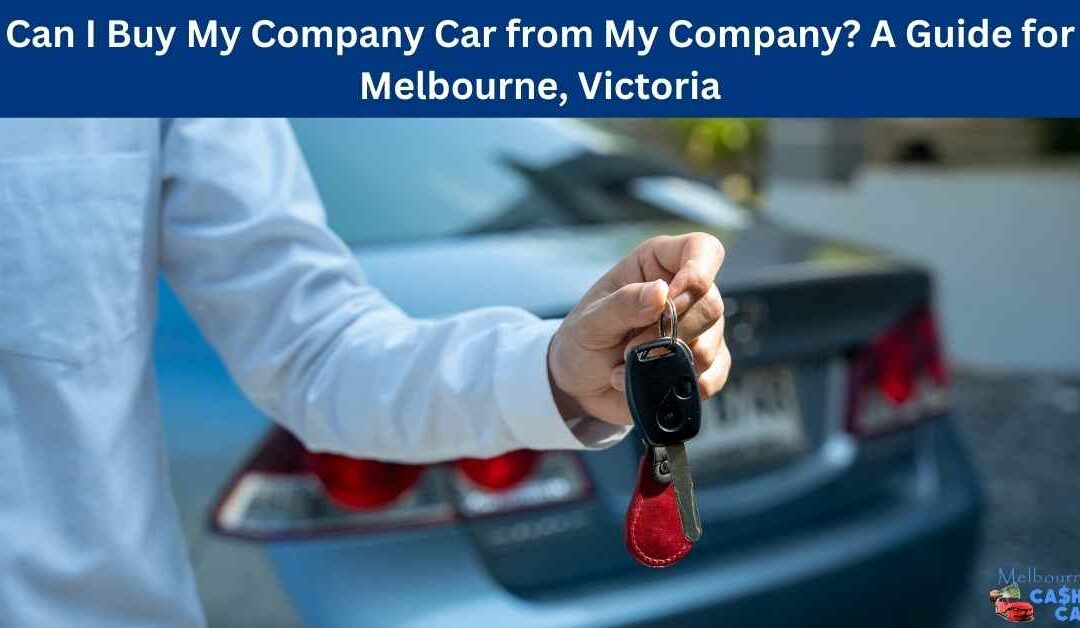As an employee of a company, you may have the opportunity to use a company car for business or personal purposes. Over time, you might develop an attachment to the vehicle and wonder if it’s possible to purchase it from your company. In this article, we will explore the concept of buying your company car and discuss the relevant considerations for employees based in Melbourne, Victoria.
1. Understanding Company Car Ownership
Before diving into the details, it’s crucial to grasp the concept of company car ownership. A company car is a vehicle provided by an employer for the use of an employee during their employment period. Typically, the vehicle is registered under the company’s name and is primarily intended for business-related activities.
2. Company Car Policies and Guidelines
When it comes to purchasing a company car, it’s essential to review your employer’s policies and guidelines regarding the sale of company assets. Every company has its own rules and regulations, so it’s important to understand the specific guidelines your employer has put in place.
3. Tax Implications
In Melbourne, Victoria, tax considerations play a significant role in determining whether you can buy your company car from your employer. The Australian Taxation Office (ATO) treats the sale of a company car to an employee as a fringe benefit. This means that the value of the vehicle is subject to Fringe Benefits Tax (FBT) unless certain exemptions apply.
Read : How much to hire a car trailer?
4. Exemptions and Conditions
There are a few exemptions and conditions that might allow you to purchase your company car without incurring FBT. These exemptions typically apply when:
- The vehicle is used primarily for business purposes and the private use is minor (for example, commuting to and from work).
- The vehicle has been used by the employee for an extended period, usually exceeding four years.
- The vehicle is sold at or below its market value.
5. Valuation of the Vehicle
Determining the market value of your company car is crucial to assess its affordability and potential FBT implications. The ATO provides specific guidelines for valuing vehicles in these transactions. Generally, the market value is determined by using either the vehicle’s cost price, a market selling value, or an independent valuation.
6. Negotiating the Purchase
If you decide to proceed with buying your company car, it’s important to negotiate the terms of the purchase with your employer. Factors to consider during negotiations may include the final purchase price, any potential modifications or repairs required, and the transfer of registration and insurance.
7. Financing the Purchase
When it comes to financing your company car purchase, there are several options available. You can choose to pay the full purchase price upfront using your savings or obtain financing from a bank or financial institution. It’s advisable to consider the interest rates, repayment terms, and any associated fees before finalizing your decision.
Read : Can p platers have alcohol in the car?
8. Legal and Administrative Requirements
To transfer ownership of a vehicle, certain legal and administrative requirements must be fulfilled. In Melbourne, Victoria, you will need to complete a transfer of registration form, provide proof of identity, pay transfer fees, and update the vehicle’s insurance details. It’s recommended to consult the VicRoads website or visit a local VicRoads customer service center for detailed information on the process.
9. Maintenance and Post-Purchase Considerations
Once the purchase is complete and you become the owner of the company car, it’s important to consider the ongoing maintenance costs, including servicing, repairs, insurance, and registration fees. It’s advisable to budget for these expenses to ensure the smooth operation and longevity of your vehicle.
Conclusion
While the option to purchase your company car from your employer exists, it’s crucial to understand the policies, tax implications, and legal requirements associated with such transactions. As an employee based in Melbourne, Victoria, you must navigate the relevant local regulations, particularly regarding Fringe Benefits Tax. By familiarizing yourself with the guidelines and seeking professional advice when needed, you can make an informed decision and potentially become the proud owner of your company car. Remember to consult with your employer and consider all the necessary factors before proceeding with the purchase.
If you are in Glen Waverley, Victoria 3150, and looking for car disposal Melbourne or car removal Werribee, below is the best way to visit us.
Contact us at
Melbourne VIP Cash For Cars
Unit 3/2 Lace St
Eumemmerring VIC 3177
(03) 9067 7578

